Widay's dog tag was discovered by John Douglas in Popondetta. Daughter Eileen Strebing saw the tag listed on PacificWrecks and informed her father. Justin Taylan delivered the dog tag on December 19, 2006, just in time for Christmas.
Frank was born on October 7, 1924 in Newport, New York. Before the war, he worked on his father's farm and in a coffee factory. On March 25, 1943 enlisted in the U.S. Army and was trained in toxic gas handling school at Macdill Field at Tampa, Florida. Sent overseas to Brisbane, Australia he was assigned to the 892th Chemical Company.
As a member of this Chemical Warfare company, he was sent by ship to Oro Bay, to work creating and servicing chemical weapons for Army Air Force aircraft: smoke screens and maintaining mustard gas bomb stockpiles.
At Oro Bay, Widay worked at the airfields to load chemical weapons onto aircraft before missions, including white phosphorous and smoke. Sometimes, working around the clock in day and night shifts. There was strictly a no smoking policy, and all the bombs were stored outdoors.
Radio broadcasts by 'Tokyo Rose' said things like "The Japanese are going to use poisonous gas on American troops" so the American troops were prepared to use mustard gas. She would also say things like "Americans, you'll never make it" and played sad songs to try and break our morale.
Next, the unit moved to Biak Island and continued its work with aircraft weapons, including mixing and creating a new 'jelly' weapon: napalm. Making napalm involved mixing its base ingredients then loading the jelly into aircraft drop tanks and 55 gallon drums. Everyone was amazed with this new jelly and its destructive properties. His unit was attached to the B-25 strafer unit: 345th Bombardment Group "Air Apaches".
The 892th Chemical Company landed at Leyte. There, Widay witnessed a horrific new Japanese weapon: kamikaze aircraft. Ashore, his unit was subjected to a Japanese paratrooper attack on December 7, 1944. This was the only time he fired his personal weapon: at descending paratroopers. After a frightening night, the attack was neutralized.
Next, his unit moved to the Manila area. After the liberation of the San Miguel Beer factory, they liberated 500 gallon drums of warm beer.
Once, Widay participated in a bizarre combat mission. C-47s were used on a mission to bomb Carabao Island. First, P-38s strafed the island's antiaircraft pits, then C-47s loaded with 55 gallon drums of napalm, armed with white phosphorus flares were dumped out of the side of the C-47, which had the door removed.
Frank had the job of kicking out the drums, while another crew member ignited the fuse on the flare. When the barrels ignited below the transport, they could feel the heat. Frank worried "One tracer hitting our plane would have blown us up with all those barrels aboard.' After action photograph revealed several hits on gun batteries.
Finally, Widay landed on Ie Shima. He was near war correspondent Ernie Pyle when he was shot. According to Frank: 'The Japanese soldier came out of a hole and shot Pyle, but that man did not last long after that". Not taking any chances, Widay assisted clearing other crevices and holes using a flamethrower, sometime they will
Given the company's flamethrower, Widay assisted clearing other holes. Sometimes, they were empty other times they were not.
Later, the Americans were subjected to a huge typhoon that hit the island. Widay was on le Shima when the war ended. He watched the Betty bomber land at Ie Shima that transported the Japanese surrender delegation to the island.
Widay was later sent home from le Shima by ship to San Francisco, but they were caught in a typhoon and it drove the ship off course to Seattle, Washington. He was demobilized in January 1946.
Back home, Widay tried out for major league baseball for the Brooklyn Dodgers and played outfield with Jackie Robinson who was also at the same tryouts. Afterwards, he got married and returned to work in upstate New York at Remington Arms and later Scheidelman's Food Distribution Center. Today, he lives in retirement with his wife, Jane and his children and grandchildren nearby. |
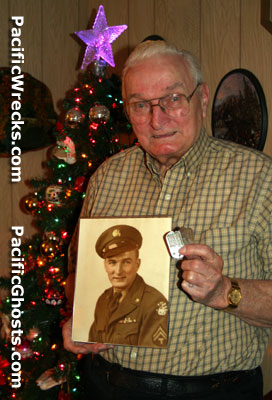
Christmas Surprise: Frank with his dog tag
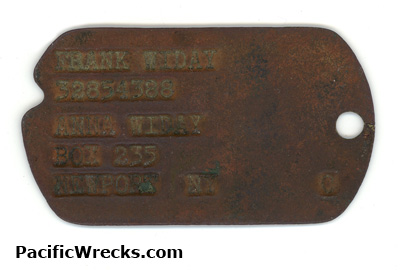
Frank Widay Dog Tag found in New Guinea
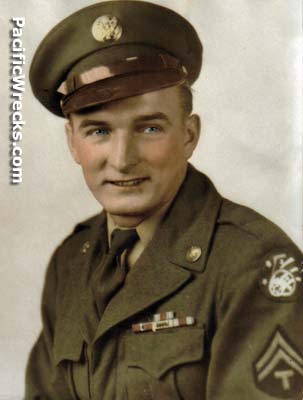
Frank Widay in dress uniform
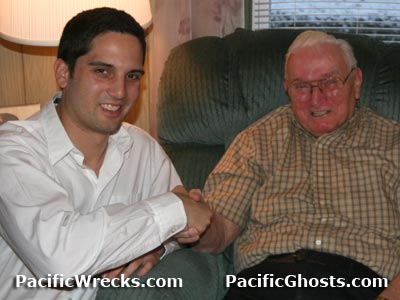
Frank receives his dog tag from Justin Taylan
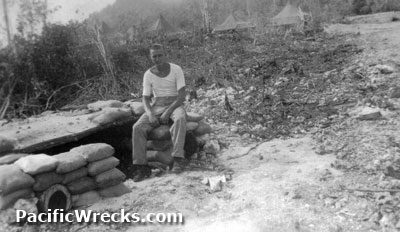
Frank seat at air raid shelter at Dobodura

American GI with New Guinea women
Utica Observer Dispatch
World War II dog tag
returned to Yorkville veteran
February 26, 2007
|